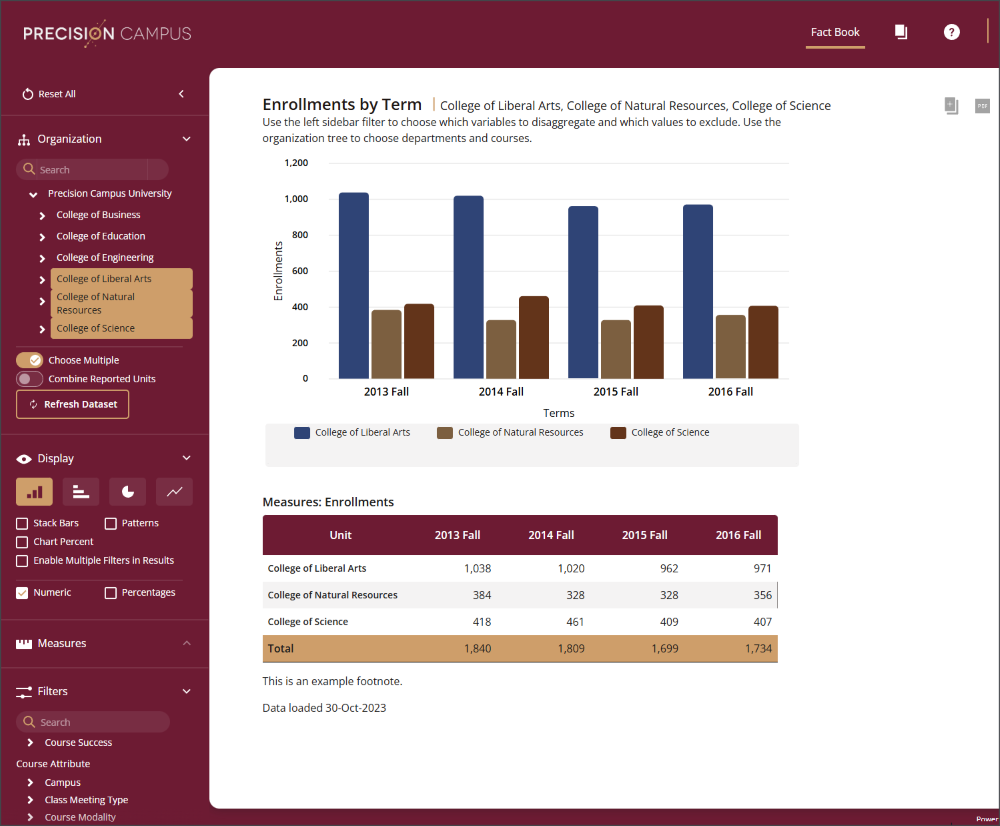
Tracking College Enrollment Trends
What is the Current State of Enrollment in Higher Education?
The higher education landscape is changing — most noticeably when looking at enrollment patterns for colleges and universities all across the country.
Your data analytics platform will show that enrollments typically fluctuate on a day-to-day basis. However, declines have persisted for some time now, causing institutional leadership to second-guess strategies.
The Data Behind Enrollment Trends
There are many internal and external factors that can lead to enrollment variabilities, whether on a semester-by-semester or year-over-year basis. We’ve found the following current events to be the biggest contributors:

The High Cost of Tuition
Comparing present day to 30 years ago, TheBestSchools.org reports the following:
- 146% tuition increase for private 4-year schools
- 225% tuition increase for public 4-year schools
- $1.4 trillion of student loan debt

A Drop in the U.S. Birthrate
Scholars from the University of New Hampshire estimate that between 2008 and 2013, 2.3 million fewer babies were born.
When you compare this drop to the expansions being made at many institutions, there will inevitably be too many open slots and not enough applicants.

The Economy
A healthy economy has traditionally meant low college admission rates. In contrast, college admissions across the country spiked during the 2007-2008 recession when unemployment rates were high and economic uncertainty was prevalent.
When the recession was over in 2011, the National Student Clearinghouse Research Center found that college enrollments dropped by close to 1 million students — and it’s been on a consistent decline ever since.
These external factors are causes for concern, but not impossible challenges.
Post-secondary and ongoing education will always be valuable, even as the industry evolves and trends fluctuate. The key to surviving lies in using what your institution already has an abundance of — data — to your benefit.
How Data Analytics Software Supports Your Institution’s Efforts
There’s no reason to hope for a recession. Staying ahead of the volatility in the industry requires making data-driven decisions, which can only be achieved by gaining a complete view of your institutional data.
Precision Campus was built purposefully for higher education by a founder who has spent his entire career working in institutional research. Our data analytics platform takes standard institutional data sets — such as enrollment numbers — and transforms them into interactive, pattern-revealing tools.
Cloud-based, automated and fully hosted, Precision Campus includes the standard required reports, with the ability to customize them to your exact needs and goals. Plus, with AI Summary and Precision Chat — AI-powered tools that help you unearth and analyze institutional data to identify enrollment trends — our platform provides the help you need to address the challenges your school currently faces.
- See a daily, real-time view of enrollments with our year-over-year enrollment report
- Analyze a full-time student equivalent report as a budgeting tool
- Check your census productivity report for a look at your financial stability
- Assess classroom utilization data to better allocate resources
FAQs
What factors are influencing college enrollment trends today?
Enrollment is shaped by several factors. Steadily rising tuition and student loan burdens, restrictions on international students, reduced eligible population as a result of long-term birthrate declines and the state of the economy all have an impact on enrollment numbers.
How can data analytics improve enrollment management?
Analytics can give institutions a clear view of what’s happening now and what might happen next, enabling teams to track year-over-year enrollment trends, monitor full-time-equivalent (FTE) counts, assess classroom utilization and more. With the right tools, you can move beyond intuition and anecdotal observations and begin making strategic decisions regarding program mix, marketing, retention support and more based on evidence and data patterns.
What makes Precision Chat and AI Summary valuable for institutional research?
These tools are invaluable to enrollment teams in the following ways:
- With AI Summary, you can generate a narrative summary of your reports. It uses AI to sift through your enrollment data, identify trends, highlight key observations and translate raw information into insights.
- Precision Chat is a conversational tool that allows users to ask plain-language questions — for example, “Which program’s enrollment dropped most in the last two years?” — and receive answers based on the underlying data from your Precision reports. This means faster access to actionable takeaways and less time spent navigating dashboards or writing complex queries.
Is the software customizable for different types of institutions?
Yes. Precision Campus is designed with higher education institutions — from small liberal arts colleges to large universities — in mind and supports customization. The platform’s standard reports can be tailored to your school’s exact needs.
How can I access or request a demo of the platform?
To request a demo, please get in touch with our team by filling out the form here. You may also explore the Precision Campus platform’s capabilities on your own by accessing our demo site.
What data sources does the software track?
Precision Campus’ software tracks the following focus areas: student outcomes, retention and student success, course success rates, year-over-year enrollment, course section optimization and tuition and revenue.
